News from Maison de la Gare
“I Still See the Talibés Begging”
Tweeter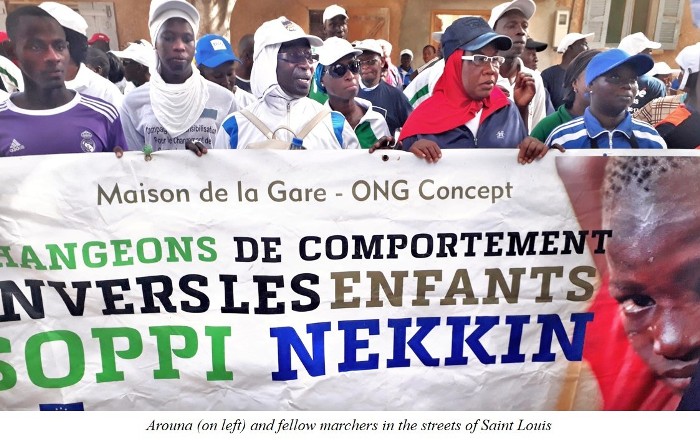
Human Rights Watch reports on progress in stopping child begging in Senegal, and Maison de la Gare responds
On Tuesday, July 11th, Issa Kouyaté joined
human rights activists from across Senegal at a
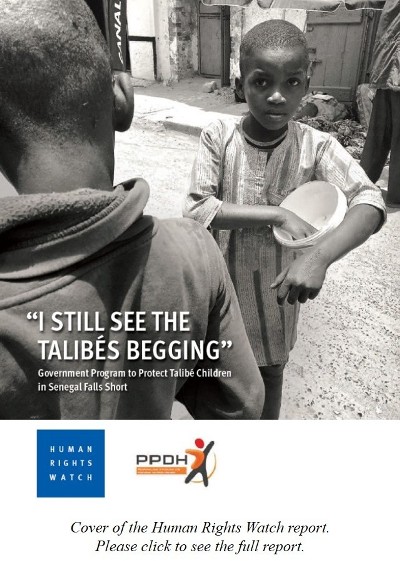 press conference in Dakar at which Human
Rights Watch presented their most recent report on progress in eliminating child begging
in Senegal. While this important report signals some progress, its sad conclusion is that
efforts to date fall far short of what is needed.
Please click on the photo of the report’s cover page here to access the full text.
press conference in Dakar at which Human
Rights Watch presented their most recent report on progress in eliminating child begging
in Senegal. While this important report signals some progress, its sad conclusion is that
efforts to date fall far short of what is needed.
Please click on the photo of the report’s cover page here to access the full text.
Maison de la Gare responded to this report by organizing a march through the streets of
Saint Louis. Arouna Kandé, a talibé staff member, writes: “As a talibé who has lived
maltreatment in my daara, I do not want my young brothers to have to suffer the same fate
as I did. This is why I joined the march through the streets of Saint Louis, following
a banner reading SOPPI NEKKINOU XALLE YI (Behavior Towards Children Must Change).
We set out on Charles de Gaulle Avenue near Maison de la Gare's center at about 9 a.m.
All of the major actors and partners in the struggle against child abuse joined us in
this mobilisation: Terres Rouges, Action Femme Enfant, Claire Enfance, Association
Jeunesse Espoir  and Univers de l’enfant along with the government agencies Action Sociale
and Educational Action in Open Environments (AEMO) of the Ministry of Justice, among many
others. Saint Louis' popular walking clubs joined us as well, as their members are also
Senegalese citizens who are very concerned about the talibé problem. Our route took us
through several areas of Saint Louis where the daaras which are ‘home’ to talibé children
are concentrated. The walk lasted for four hours, and had a great impact on everyone who
saw it or heard of it.”
and Univers de l’enfant along with the government agencies Action Sociale
and Educational Action in Open Environments (AEMO) of the Ministry of Justice, among many
others. Saint Louis' popular walking clubs joined us as well, as their members are also
Senegalese citizens who are very concerned about the talibé problem. Our route took us
through several areas of Saint Louis where the daaras which are ‘home’ to talibé children
are concentrated. The walk lasted for four hours, and had a great impact on everyone who
saw it or heard of it.”
In the words of the summary of the Human Rights Watch report: “Across Senegal, an estimated 50,000
boys living in traditional Quranic boarding schools, or daaras, are forced to beg for
daily quotas of money, rice or sugar by their Quranic teachers, known as marabouts.
Children in these daaras are often beaten, chained, bound, and subjected to other forms
of physical or psychological abuse amounting to inhuman and degrading treatment.
In June 2016, the government demonstrated meaningful political will by introducing a
new program to 'remove children from the streets' (known in French as the ‘retrait des
enfants de la rue,’ or simply the ‘retrait’), intended to crack down on forced child
begging. ...”
“In the month following the program’s launch, aid workers, rights
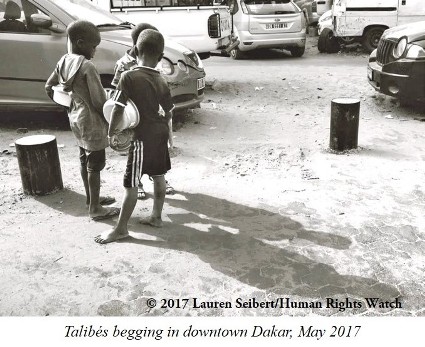 activists, and government
officials observed a dramatic drop in the presence of children begging in both Dakar and
Saint-Louis. However, the failure to investigate and prosecute abusive teachers ultimately
led to a return of the status quo. ...”
activists, and government
officials observed a dramatic drop in the presence of children begging in both Dakar and
Saint-Louis. However, the failure to investigate and prosecute abusive teachers ultimately
led to a return of the status quo. ...”
“From May to June 2017, Human Rights Watch and the Platform for the Promotion and
Protection of Human Rights (PPDH), a coalition of 40 Senegalese children’s rights
organizations, observed hundreds of children living in squalid, unsanitary daaras in Dakar
and Saint-Louis. Nineteen of the 43 current and former talibé children Human Rights Watch
interviewed on the streets and in children’s shelters said that they are beaten if they
fail to study, try to 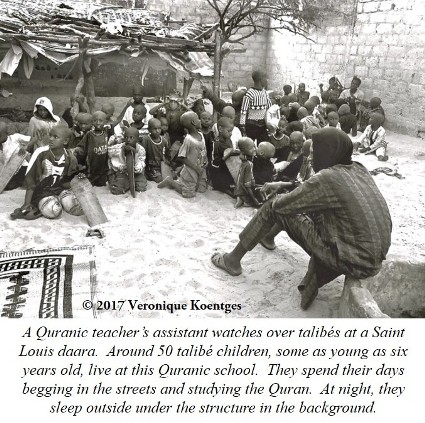 run away, return late to the daara, or fail to bring back daily
quotas. Several marabouts interviewed in Quranic schools admitted to beating their
talibés for the same reasons.
run away, return late to the daara, or fail to bring back daily
quotas. Several marabouts interviewed in Quranic schools admitted to beating their
talibés for the same reasons.
In the northern city of Saint Louis, Human Rights Watch and social workers from the
children’s shelter Maison de la Gare encountered a 9-year-old talibé hunched over in pain
at the bus station around 1 a.m., his T shirt pulled over his head. Tears streaked the
child’s face as he described the severe beating he had received, administered by the
Quranic teacher’s assistant, after failing to meet the daily quota. ‘I didn’t give the
grand talibé my payment, so he beat me with a stick. He also did it to four other
talibés,’ he said. Open wounds and scars from previous beatings marked the child’s back. ...”
“Senegal has ratified all major international conventions on children’s rights. Its
penal code criminalizes physical abuse
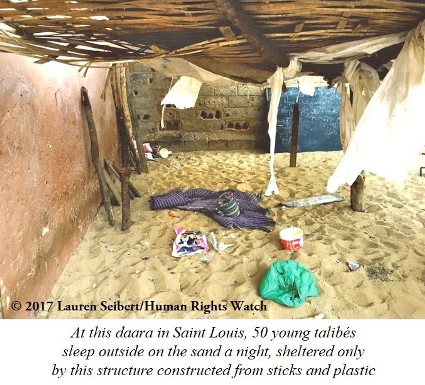 and willful neglect of children, and a 2005 law
prohibits forced begging and human trafficking. However, a law drafted in 2013 to
establish legal status and regulations for daaras had yet to be passed at the time
of writing.
and willful neglect of children, and a 2005 law
prohibits forced begging and human trafficking. However, a law drafted in 2013 to
establish legal status and regulations for daaras had yet to be passed at the time
of writing.
Human Rights Watch, PPDH, and other Senegalese civil society activists call on the
Senegalese government to strengthen the 'retrait' program, investigate and prosecute
abusive Quranic teachers, and pass the draft law to establish a legal framework to
regulate the Quranic schools.”
Arouna shares his feelings after the march. “This day was full of emotion and joy, but
of sadness too. I was very aware that we are no longer
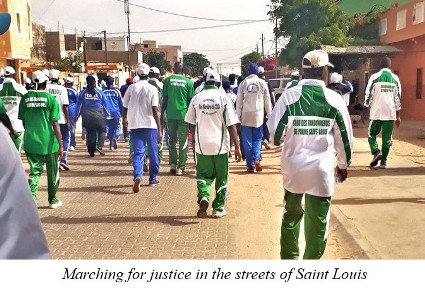 alone, standing with NGOs,
associations and institutions … some of these branches of the government. I was sad
inside myself, being reminded of the bad experiences that I had lived in my daara. But,
I was very happy to be marching with everyone struggling to improve the lives of the
talibé children.”
alone, standing with NGOs,
associations and institutions … some of these branches of the government. I was sad
inside myself, being reminded of the bad experiences that I had lived in my daara. But,
I was very happy to be marching with everyone struggling to improve the lives of the
talibé children.”
____________
We are grateful to Lauren Seibert and Human Rights Watch for their permission to
reproduce photos and text from their report. And we are particularly grateful to them
for their unrelenting determination to publicize and end child begging in Senegal, and
to all of the individuals and organizations in Senegal and around the world who are
committed to this goal and who make possible our continuing efforts in support of the
talibé children.







